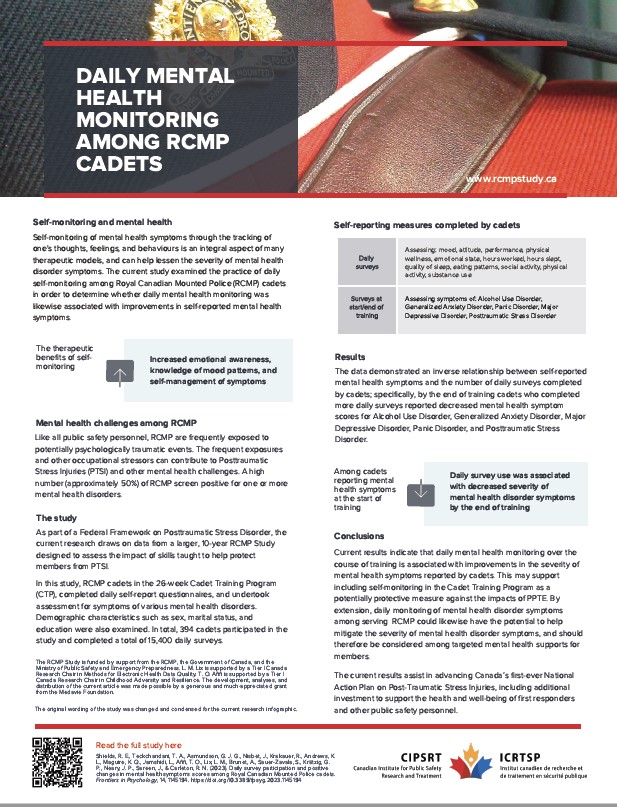Research Summaries
Why was the study done?
Like all public safety personnel, Royal Canadian Mounted Police (RCMP) officers are frequently exposed to Potentially Psychologically Traumatic Events (PPTE), contributing to high prevalence rates for Posttraumatic Stress Injuries (PTSI). Accordingly, active duty RCMP self-report high levels of symptoms for mental health disorders such as Alcohol Use Disorder, Generalized Anxiety Disorder, Major Depressive Disorder, Panic Disorder, and Posttraumatic Stress Disorder. Participation in regular mental health monitoring has been associated with reporting of improved mental health symptoms, and may provide an accessible tool to support RCMP mental health. The current study assessed relationships between self-reported mental health symptoms and the completion of daily surveys by RCMP cadets during training to determine whether daily mental health monitoring was associated with improvements in self-reported mental health symptoms.
What was done in the study?
The current research is part of a larger RCMP Study designed to assess the impact of skills taught to help protect members from Posttraumatic Stress Injuries (PTSI). A research summary of the previously published Study Protocol can be read here.
RCMP cadets in the 26-week Cadet Training Program (CTP), completed at least one daily self-report questionnaire assessing mood, physical wellness, emotional state, hours worked, hours slept, quality of sleep, and social activity, during their time in the CTP, as well as assessing for symptoms of Alcohol Use Disorder, Generalized Anxiety Disorder, Panic Disorder, Major Depressive Disorder, and Posttraumatic Stress Disorder before and after their training. Demographic characteristics such as sex, marital status, and education were also examined. In total, 394 cadets participated in the study and completed a total of 15,400 daily surveys.
What did we find out?
The data indicated an inverse relationship between self-reported mental health symptom scores and the number of daily surveys completed by cadets. Regardless of sociodemographic differences, cadets who completed more daily surveys during their time in training reported decreases in all mental health symptom scores. The results are consistent with existing evidence that the increased emotional awareness, knowledge of mood patterns, and self-management of symptoms introduced via daily self-monitoring can improve mental health symptoms overall.
Where do we go from here?
The current study indicates that daily mental health monitoring is associated with improvements in self-reported mental health symptom severity among cadets during training. The current results, and further research, may support the recommendation to include self-reflection in the CTP as a proactive measure for potentially reducing the impacts of PPTE throughout the course of RCMP service. The results also suggest that daily monitoring of mental health disorder symptoms among serving RCMP may likewise have the potential to help to mitigate mental health disorder severity, potentially informing targeted mental health supports for members.
The current results help to continue advancing Canada’s first-ever National Action Plan on Post-Traumatic Stress Injuries, including additional investment to support the health and well-being of first responders and other public safety personnel.
The RCMP Study is funded by support from the RCMP, the Government of Canada, and the Ministry of Public Safety and Emergency Preparedness. L. M. Lix is supported by a Tier I Canada Research Chair in Methods for Electronic Health Data Quality. T. O. Afifi is supported by a Tier I Canada Research Chair in Childhood Adversity and Resilience. S. H. Stewart is supported by a Tier 1 Canada Research Chair in Addictions and Mental Health. The development, analyses, and distribution of the current article was made possible by a generous and much-appreciated grant from the Medavie Foundation.
The original wording of the study was changed and condensed for the current research summary.
Original study
Teckchandani, T. A., Shields, R. E., Asmundson, G. J. G., Nisbet, J., Krakauer, R., Andrews, K. L., Maguire, K. Q., Jamshidi, L., Afifi, T. O., Lix, L. M., Brunet, A., Sauer-Zavala, S., Krätzig, G. P., Neary, J. P., Sareen, J., & Carleton, R. N. (2023). Daily survey participation and positive changes in mental health symptoms scores among Royal Canadian Mounted Police cadets. Frontiers in Psychology, 14, 1145194. https://doi.org/10.3389/fpsyg.2023.1145194
Prepared by T. Teckchandani and K. Vincent.
